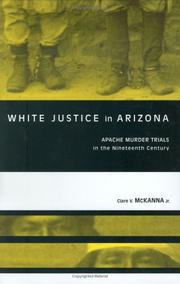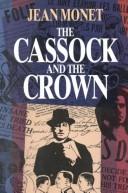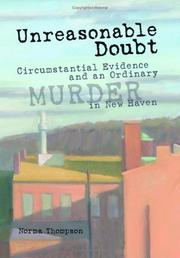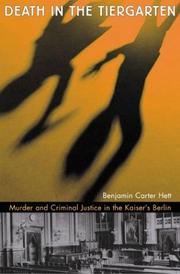| Listing 1 - 10 of 34 | << page >> |
Sort by
|
Book
ISBN: 1935503200 9781935503200 9781931112918 1931112916 Year: 2009 Publisher: Kirksville, Mo. : Truman State University Press,
Abstract | Keywords | Export | Availability | Bookmark
 Loading...
Loading...Choose an application
- Reference Manager
- EndNote
- RefWorks (Direct export to RefWorks)
Murder --- Trials (Murder) --- Murder trials --- Criminal homicide --- Killing (Murder) --- Homicide --- Swope family.
Book
ISBN: 1910979333 1910979341 9781910979341 9781910979334 1909976431 9781909976436 Year: 2017 Publisher: Hampshire, [England] : Water Side Press,
Abstract | Keywords | Export | Availability | Bookmark
 Loading...
Loading...Choose an application
- Reference Manager
- EndNote
- RefWorks (Direct export to RefWorks)
Trials (Murder) --- Murder trials --- Murder --- Borden, Lizzie, --- Borden, Lizzie Andrew, --- Borden, Lizzy,
Book
ISBN: 3732866246 3837666247 9783837666243 Year: 2023 Publisher: Bielefeld: Transcript,
Abstract | Keywords | Export | Availability | Bookmark
 Loading...
Loading...Choose an application
- Reference Manager
- EndNote
- RefWorks (Direct export to RefWorks)
F. Scott Fitzgerald once said: »Show me a hero, and I'll write you a tragedy.« In the 1990s, nobody fell deeper than O.J. Simpson. Once considered a national treasure, the athlete was accused of brutally slaying his ex-wife Nicole Brown and her friend Ronald Goldman on June 12, 1994. Within days, the media and public developed an unprecedented obsession with the story, turning a murder investigation and trial into a sensationalized reality show. Tatjana Neubauer examines the mediatization, deliberate manipulation, and the simplification of popular criminal trials for profit on television. She shows that TV conflated legal proceedings into entertainment programming by commodifying events, people, and places.
Trials (Murder) --- Murder trials --- Murder --- Mass media and crime --- Simpson, O. J., 1947-
Book
ISBN: 128357229X 9786613884749 1555537979 9781555537975 9781283572293 9781555537913 155553791X Year: 2012 Publisher: Boston : Northern University Press,
Abstract | Keywords | Export | Availability | Bookmark
 Loading...
Loading...Choose an application
- Reference Manager
- EndNote
- RefWorks (Direct export to RefWorks)
Inside one of New England's most infamous murders
Trials (Murder) --- Murder --- Murder trials --- Criminal homicide --- Killing (Murder) --- Homicide --- Investigation --- Greineder, Dirk. --- Greineder, Mabel, --- Greineder, May,
Book
ISBN: 1590565657 9781590565650 9781590565643 1590565649 Year: 2017 Publisher: Lantern Books
Abstract | Keywords | Export | Availability | Bookmark
 Loading...
Loading...Choose an application
- Reference Manager
- EndNote
- RefWorks (Direct export to RefWorks)
Murder --- Trials (Murder) --- Case studies. --- Haysom, Derek, --- Haysom, Nancy, --- Murder trials --- Criminal homicide --- Killing (Murder) --- Homicide --- Benedict, Nancy,

ISBN: 1281093432 9786611093433 142376272X 9781423762720 9781281093431 0896725545 9780896725546 0896725553 9780896725553 6611093435 Year: 2005 Publisher: Lubbock, Tex. : Texas Tech University Press,
Abstract | Keywords | Export | Availability | Bookmark
 Loading...
Loading...Choose an application
- Reference Manager
- EndNote
- RefWorks (Direct export to RefWorks)
Though trials in open court suggest impartiality, White Justice in Arizona reveals how, time and again, the judicial system of nineteenth-century Arizona denied Apaches justice. The Captain Jack, Gonshayee, Apache Kid, "Carlisle Kid," and Batdish murder cases offer a sad, compelling commentary on injustice for Native Americans. That these trials all ended in Apache convictions, Clare V. McKanna Jr. argues, proves the unfairness of applying the American legal tradition to a culture that lived by very different social and legal codes. Conquered and forced from their lands by white outsiders, Apaches found their customs and methods of maintaining social control dramatically at odds with a new and completely alien legal system, a system that would not bend to integrate Apache or any other Native American culture. Through case studies of these very different murder trials, White Justice in Arizona probes the federal and state governments' treatment of America's indigenous populations and the cultural clashes that left justice the greatest casualty.
Apache Indians --- Trials (Murder) --- Ethnic & Race Studies --- Gender & Ethnic Studies --- Social Sciences --- Murder trials --- Murder --- Diné Indians (Apache) --- Athapascan Indians --- Indians of North America --- Government relations --- Government relations.

ISBN: 1282853899 9786612853890 0773565965 9780773565968 077351399X 9780773513990 077351449X 9780773514492 9781282853898 6612853891 Year: 1996 Publisher: Montreal ; Buffalo : McGill-Queen's University Press,
Abstract | Keywords | Export | Availability | Bookmark
 Loading...
Loading...Choose an application
- Reference Manager
- EndNote
- RefWorks (Direct export to RefWorks)
On 7 January 1922 Raoul Delorme's body was discovered in a Montreal suburb. He had been shot six times at close range. The victim's half-brother, Father Adélard Delorme, quickly became the prime suspect as circumstantial evidence pointed directly to him. In one of the first uses of ballistics, police matched the bullets used in the murder to a gun he had purchased only days before the murder, there were human bloodstains in his car, and the victim's body was wrapped in a quilt that matched others found at the Delorme house. Father Delorme had also recently taken out a life insurance policy on his brother, naming himself as beneficiary, and stood to inherit most of the family's estate under Raoul's will. The Roman Catholic church, however, was an extremely powerful institution in Quebec in the 1920s. Four trials took place before a verdict was reached -- a verdict that still leaves many questions unanswered. The Delorme Affair achieved worldwide notoriety not only because it involved a clergyman but because of Father Delorme's eccentric personality, the twists and turns of the investigation, and extensive media coverage. Legendary Montreal police detective George Farah-Lajoie was in charge of the investigation and the case involved the best legal talent in Canada as well as the expertise of Wilfrid Derôme, founder of the Montreal Crime Laboratory and father of forensic medicine in North America. A fascinating true story, The Cassock and the Crown is based on trial transcripts, interviews with individuals involved in the case, and twenty-five years of archival research. It provides insight into Quebec culture in the 1920s and is a topical look, in light of recent celebrity trials, at the subjective nature of the judicial system when it deals with people in positions of prestige and power.
Murderers --- Murder --- Trials (Murder) --- Priests --- Pastors --- Clergy --- Priesthood --- Murder trials --- Criminal homicide --- Killing (Murder) --- Homicide --- Homicide offenders --- Killers (Murderers) --- Murder offenders --- Criminals --- Investigation. --- Delorme, Adélard. --- Delorme, Adelard.

ISBN: 0826265375 9780826265371 9780826216380 0826216382 Year: 2006 Publisher: Columbia, Mo. : University of Missouri Press,
Abstract | Keywords | Export | Availability | Bookmark
 Loading...
Loading...Choose an application
- Reference Manager
- EndNote
- RefWorks (Direct export to RefWorks)
"A murder trial ends in a hung jury because of the reasonable doubt of a few jurors who, faced with circumstantial evidence, refuse to judge the accused. Thompson confronts this evasion of judgment through the reexamination of the works of Faulkner, Austen, Tocqueville, Plato, and Aristotle"--Provided by publisher.
Trials (Murder) --- Jury --- Jury in literature. --- Judgments by peers --- Juries --- Trial by jury --- Trial by peers --- Trials --- Law and fact --- Lay judges --- Murder trials --- Murder --- History. --- Philosophy. --- Law and legislation --- Bazier, Anthony

ISBN: 0674038614 9780674038615 9780674013179 0674013174 0674013174 Year: 2004 Publisher: Cambridge, Mass. : Harvard University Press,
Abstract | Keywords | Export | Availability | Bookmark
 Loading...
Loading...Choose an application
- Reference Manager
- EndNote
- RefWorks (Direct export to RefWorks)
From Alexanderplatz, the bustling Berlin square ringed by bleak slums, to Moabit, site of the city's most feared prison, Death in the Tiergarten illuminates the culture of criminal justice in late imperial Germany. In vivid prose, Benjamin Hett examines daily movement through the Berlin criminal courts and the lawyers, judges, jurors, thieves, pimps, and murderers who inhabited this world. Drawing on previously untapped sources, including court records, pamphlet literature, and pulp novels, Hett examines how the law reflected the broader urban culture and politics of a rapidly changing city. In this book, German criminal law looks very different from conventional narratives of a rigid, static system with authoritarian continuities traceable from Bismarck to Hitler. From the murder trial of Anna and Hermann Heinze in 1891 to the surprising treatment of the notorious Captain of Koepenick in 1906, Hett illuminates a transformation in the criminal justice system that unleashed a culture war fought over issues of permissiveness versus discipline, the boundaries of public discussion of crime and sexuality, and the role of gender in the courts. Trained in both the law and history, Hett offers a uniquely valuable perspective on the dynamic intersections of law and society, and presents an impressive new view of early twentieth-century German history. Table of Contents: Acknowledgments Introduction 1. In Moabit 2. The Berlin of Surrogates 3. Honorable Men 4. Justice Is Blind 5. "Were People More Pitiless Fifteen Years Ago?" Epilogue Appendix: Regimes and Rulers Abbreviations Notes Archival and Primary Sources Index Death in the Tiergarten is an impressive book. Written in a light and entertaining style, with elegance and wit, it is a rich source of thought-provoking insights. Hett offers his own distinct spin on some of the common themes of Berlin literature--crime, sex, sensation, mass media, and the dramatic character of life in the modern metropolis. This unusually successful and effective work of scholarship has the potential to reach a broad audience.--Jonathan Sperber, University of Missouri at ColumbiaAn extremely rich and well-argued analysis of the culture of the criminal courtroom in Wilhelmine Germany. Using stories about love, lust, betrayal, and honor--crime stories and city stories--Benjamin Hett pries open Berlin's public life in brilliant, unexpected ways.--Peter Fritzsche, author of Reading Berlin 1900
Criminal justice, Administration of --- Criminal courts --- Trials (Murder) --- Murder trials --- Murder --- Courts, Criminal --- Correctional institutions --- Courts --- Criminal procedure --- Administration of criminal justice --- Justice, Administration of --- Crime --- Criminal law --- Criminals --- History --- Law and legislation

ISBN: 1611920388 9781611920383 9781611926453 1611926459 1558854762 9781558854765 Year: 2006 Publisher: Houston, Tex. : Arte Publico Press,
Abstract | Keywords | Export | Availability | Bookmark
 Loading...
Loading...Choose an application
- Reference Manager
- EndNote
- RefWorks (Direct export to RefWorks)
Trials (Murder) --- Race discrimination --- Jury selection --- Bias, Racial --- Discrimination, Racial --- Race bias --- Racial bias --- Racial discrimination --- Discrimination --- Murder trials --- Murder --- Hernández, Pete --- Jackson County (Tex.) --- Jackson Co., Tex. --- Hernandez, Pete
| Listing 1 - 10 of 34 | << page >> |
Sort by
|

 Search
Search Feedback
Feedback About UniCat
About UniCat  Help
Help News
News